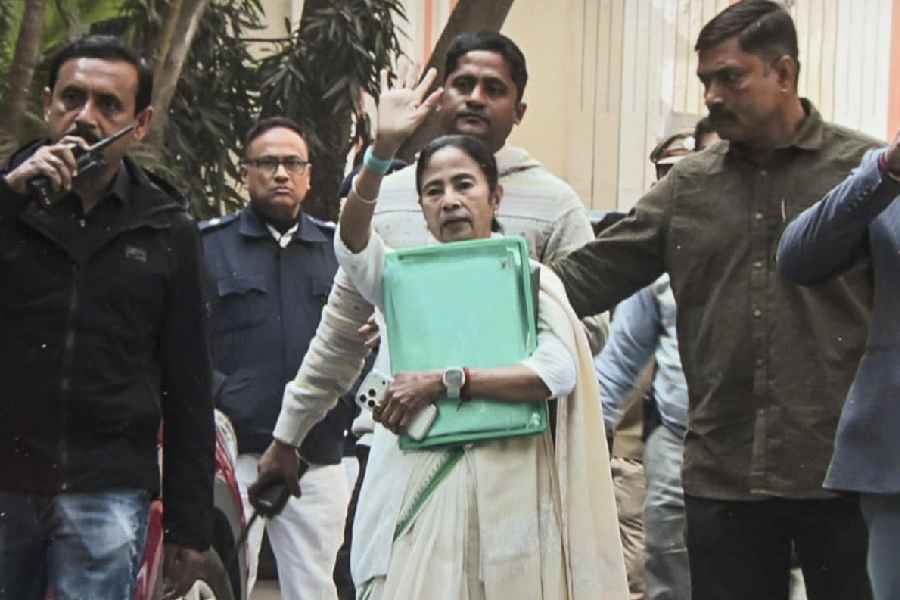 |
| Pallavi’s parents, Sumita and Atanu Purkayastha (extreme right), outside the sessions court in Mumbai on Monday. (Fotocorp) |
Mumbai, June 30: A high-rise watchman has been convicted of a young woman resident’s murder that sent a shiver down Mumbai society because the ruse the protector-turned-predator used would have left virtually any urban apartment dweller vulnerable.
The security guard had switched off power to the 16th-floor flat of Pallavi Purkayastha, a 25-year-old lawyer who studied at Calcutta’s La Martiniere for Girls, so he could enter with the electrician and steal the apartment keys for a late-night sexual attack.
A Mumbai sessions court today convicted Sajjad Ahmed Abdul Aziz Mughal, 26, of the August 2012 murder in suburban Wadala. He will be sentenced on Thursday.
“A case of murder, molestation and criminal trespass has been proved against you,” judge Vrushali Joshi told Mughal, who nodded silently.
Watching from the courtroom seats were Pallavi’s parents Atanu and Sumita Purkayastha, senior IAS officers working in New Delhi with the ministries of agriculture and telecommunications, respectively.
Missing was Avik Sengupta, Pallavi’s live-in partner, fiancé and fellow lawyer who, after his key depositions as chief prosecution witness, died last November of an inflammatory brain disorder.
A prosecution source blamed Mughal for the double tragedy, saying Avik’s ailment was brought about by depression following the murder. A medical expert confirmed that psychological trauma can, in some circumstances, precipitate an underlying inflammatory brain condition.
The defence had tried to pin the blame on Avik, who had discovered his fiancée’s blood-soaked body when he returned from work early in the morning.
“We want nothing less than the death penalty,” said Pallavi’s mother Sumita, director-general of the National Institute of Communication Finance, which functions under the Union telecom department.
“Yes, the verdict has brought some sort of closure as far as justice goes. But we’ll take the loss to our grave.”
Atanu, a joint secretary in the agriculture ministry, said: “We want a deterrent message to go out to anyone doing this to any woman. The last two years have been hell for both families (the Purkayasthas and the Senguptas).”
Pallavi, once a national-level swimmer, worked with Excel Entertainment as a legal adviser. She shared her flat with Avik, whom she was to marry in “three or four months”, Atanu said.
Mughal, a resident of Uri in Kashmir’s Baramulla district, had been posted at the Himalayan Heights apartment complex by a security agency without a proper background check, police say.
Special public prosecutor Ujjwal Nikam told The Telegraph that Pallavi had once told Avik that Mughal would stare constantly at her but the boyfriend had made light of it.
“Mughal had also told another watchman at the building that he found Pallavi very attractive and wanted to have sex with her,” Nikam said. “When the other watchman objected to the remark, Mughal said he was joking.”
The prosecution’s version of the events of the evening and night of August 9, 2012:
Mughal switched off power to Pallavi’s flat twice, aware she would have to seek his help. He called and accompanied an electrician twice to repair the “fault” and, on the second visit, stole the apartment keys that he knew lay on the table next to the living-room door.
He used these keys to enter a third time, around 1.30am, and tried to sexually assault Pallavi who was sleeping. When she fought back, tearing a tuft of hair off Mughal’s head, he slit her throat and fled the building. He was arrested the next day from a railway station.
A trail of bloodstains has shown that Pallavi, bleeding profusely, rang her neighbours’ doorbells but none woke to help her, the police say. The police filed a 434-page chargesheet and relied on 40 witnesses.
Atanu complimented joint commissioner of police Himanshu Roy, investigating officer Mahesh Tawade and Nikam for their “excellent job” in a case built entirely on circumstantial evidence.
Atanu had held several positions in Bengal till 2009, including the post of secretary in the agriculture, minority affairs and disaster management departments.
The crime bears similarities to the 1990 murder of teenaged Hetal Parekh in Calcutta by the security guard of her apartment block, Dhananjoy Chatterjee, who was hanged in 2004.










